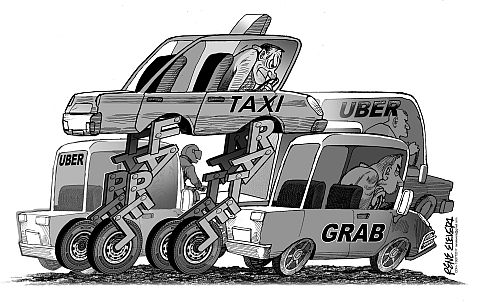The issue is not so much whether it’s high time to approve a higher taxi fare rate — though the riding public is usually averse to this — as how a higher taxi fare rate would impact on the taxi industry’s competitiveness against Uber, Grab and other transport network services (TNS) companies.
The Land Transportation Franchising and Regulatory Board (LTFRB) floated the proposal just as its suspension order against Uber was coming to an end, and while the higher fare rate was welcomed by transport groups, it remains to be seen how the commuters would react to it.
So how would a higher fare rate for taxis make them any less or more competitive against Uber and Grab that, while admittedly imposing fluctuating fare rates, offer fare rate promos that can go higher and lower depending on prevalent traffic conditions and just how generous they happen to be?
Taxi operators welcome a higher fare rate because it would help ensure that they would earn a bit more substantial income perhaps even with fewer rides, and their income would certainly double or triple depending again on prevalent traffic conditions and seasons, like the upcoming holidays.
Higher fare rates may help taxi operators break even more frequently. But will they enjoy the same patronage enjoyed by Uber and Grab from the commuters? It is debatable along with the proposal for higher fare rates.
The higher fare rate will supposedly undergo public hearing or at least what the LTFRB can muster up as a public hearing considering how public participation in these hearings had been lackluster at best.
That’s because the riding public may have resigned themselves to the fact that the LTFRB, for all its authority, had been ineffective in imposing compliance from taxi operators and drivers on the previous P10-less fare rate and wouldn’t be as reliable at listening to their plea for affordable fare rates.
But for now, at least most commuters are relieved that Uber has resumed operation along with Grab so they have viable alternatives from the existing taxis and even passenger jeepneys, most of whose operators have become resentful about their competition.
Commuters are usually against higher fare rates for public utility vehicles (PUVs) unless they are persuaded about the justification for such increase.
For taxi operators, a higher fare rate is a matter of survival since they realize that the competition offered by Uber and Grab means they would have to make up for reduced earnings by charging commuters more even if it would mean turning off these commuters and leading them towards their competitors.
Anyway, we hope the riding public can join the public hearings and give their input on the fare rate increase if only to make the transport operators and the LTFRB listen to their sentiments.
Disclaimer: The comments uploaded on this site do not necessarily represent or reflect the views of management and owner of Cebudailynews. We reserve the right to exclude comments that we deem to be inconsistent with our editorial standards.

